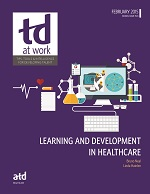ATD Blog
Asking the Right Questions in Healthcare L&D
Wed Feb 18 2015


Elliot Masie once said, “Bad education is bad education no matter how it is served.” He was referring to a trend in the education field at the time to turn everything into an automated PowerPoint and call it education. Healthcare has certainly been guilty of this. Prettying up our slides or automating them does not make them more educational.
The basic premises of education and the research behind them are pretty universal across industries. However, each industry has unique drivers, standards, challenges, and constraints that must be addressed—and this certainly applies to the healthcare industry.
If we fail to address those unique attributes, the education can be seen as irrelevant. As adults, we view our world through the lenses of our experiences and acquired knowledge. If something conflicts with our frame of reference, it can interrupt the learning process. For instance, if you are training neonatal nurses how to document patient care in an electronic health record system, but give them a scenario that has wrong drug doses for a neonate, they could be so distracted by the incorrect scenario that learning may not take place.
Healthcare’s Challenges in Education
Healthcare faces a continual state of change due to new research, government mandates, reimbursement models, and other issues. This creates a need for continual learning and changes to educational materials.
So, in addition to the day-to-day educational needs of new hire orientation and mandatory refresher courses, new equipment, systems, medical breakthroughs, processes, and payer modules are increasing the responsibility of clinicians. In addition to all these tasks, we must also teach clinicians how to educate patients and deal with increasing cuts. Unfortunately, education teams are being reduced in size right when clinicians need more education and are incurring higher patient-to-clinician ratios.
Response: Ask the Right Questions
It is more important than ever to deliver and reinforce education in a manner that creates true results. Doing things as we have always done them will no longer cut it. We must be looking for ways to help clinicians learn with ease so they can spend more time providing care to patients. Questions to ask include:
Is our new hire education model still effective?
Are there new technologies that can be utilized?
Are there new methods that create better outcomes?
How do I measure the outcomes to ensure I am spending my time in the right areas?
How do I make sure I am delivering relevant content to each healthcare role?
Am I properly prioritizing my work to ensure I am delivering the content most important to my organization?
What are other healthcare organizations doing to obtain greater learning outcomes in a shorter amount of time?
Healthcare learners drive the work of healthcare learning professionals. However, organizational learning will always play a big role in achieving the outcomes that help manage the challenges of the healthcare sector. Therefore, organizational learning can increase satisfaction, recruitment, and retention, and promote healthy work environments.
Bottom line: Asking the questions above will be paramount to your success.
To learn more, read the February 2015 bonus issue of TD at Work, “Learning and Development in Healthcare.” This issue will explain how learning needs in the healthcare field differ from other professions, the ADDIE model can be modified for the healthcare sector, to align training with current reporting requirements, to choose the correct tools to evaluate the effectiveness of L&D programs.
